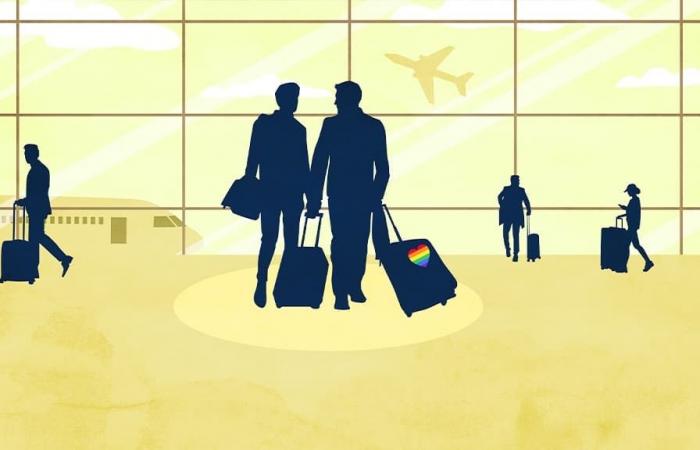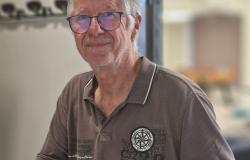Itinerary, accommodation, means of transport… Preparing a holiday abroad is no easy task for anyone. But the task is even more tedious for LGBT+ people, who cannot travel everywhere without risk. This forces some to hide their sexual orientation in certain destinations.
At 29, Émeric is a travel enthusiast. Alone, with friends or as a couple: as soon as he can go to the other side of the world, the young man buys his tickets and jumps on a plane. This Parisian is however well aware of the limits of his desire for discovery: as a homosexual person, he knows that not all regions of the world are ready to welcome him with open arms.
“A trip when you’re gay requires a bit of a special preparation time. There are questions you have to ask yourself because you can’t set foot everywhere,” asks this IT engineer.
To date, homosexuality is illegal in around sixty countries and transgender identity is still not recognised in a large part of the world, according to the count of Ilga, a leading LGBT association. In a number of countries in Africa, the Middle East and even Southeast Asia, LGBT+ people are liable to prison sentences or even the death penalty.
“The basis is to check”
This is why before each trip, Émeric takes the time to check the risks he runs as a member of the LGBT+ community. The first step therefore consists of finding out carefully about the destination that interests you: firstly on the legislation in force in the country and the region, and secondly on the open-mindedness and mentalities of the population. local.
“The basis is to check whether you are going to land on friendly territory or not,” he summarizes. “I first look at whether, in the event of a problem, the local authorities would be on my side or not, then whether the people there tolerate it or not, in order to have an idea of how to behave.”
“Safety is a real concern for LGBT people who travel,” notes Danny Kronström, creator of the online tourist guide. Gay Traveler. “Safety is a very recurring question,” comments this 43-year-old Canadian, also at the origin of the podcast Queer or not? on the same theme.
Its website, created in 2014, guides queer and French-speaking travelers in their choice of destinations and accommodations around the world, in addition to providing advice and other useful recommendations.
There are valuable resources available for planning a trip, such as the interactive maps on the website Equaldex that map the progress of LGBTQ+ rights around the world. And more and more booking platforms like Airbnb, Misterb&b or the site Everywhere is queer list establishments LGBT-friendly.
Before leaving, Marine L. also got into the habit of consulting the websites of the embassies of the countries she plans to travel to and the recommendations of the Ministry of Foreign Affairs. In addition to word of mouth, this 35-year-old lesbian journalist, based in Paris, also inquires on the websites of tourist guides such as Routard or Lonely Planet, which maintain a page on LGBT+ rights in their destinations.
“One week on site was enough for me”
However, this does not prevent him from some disappointments. Two years ago, she and her girlfriend went for a week in the sun near Agadir, Morocco, but they’re not sure they’ll repeat the experience. At the beach, in the streets and even at the hotel, Marine remembers not being really at ease, to the point of feeling “hyper relieved” upon her return to France.
Especially since an incident disrupted their trip, since a member of the hotel staff inadvertently entered their hotel room at an inopportune moment… sparking a moment of panic in the two women, who were unaware at the time what consequences such a mishap could have.
In Morocco, “indecent or unnatural acts with an individual of the same sex” are punishable by a 3-year prison sentence and a fine. And the law is still applied according to Ilga, which has recorded several convictions in recent years.
“I felt like I spent a week in detention, which is not very comfortable,” confides Marine, who admits that “one week on site was enough for her.”
“Honestly, it cost me to constantly have to be careful about my actions, my words, who was around us,” she explains.
Similarly, Léonie Nogueira and her wife Pauline are exercising great caution on a daily basis during the big camper van road trip they undertook in February 2023 across Europe, especially since they are traveling with their three-year-old son. So when the two women park their vehicle – which is adorned with the pseudonyms of their Instagram and Tiktok accounts – in an area that is uncertain about the level of acceptance of LGBT people, they switch their social networks to private mode.
“With a child, we don’t take any safety risks. We trust our instinct, that is to say when it’s very rural and remote areas, or just when we don’t feel it because of the looks , we automatically switch our travel account to private”, explains this 30-year-old lesbian traveler, from Tours (Indre-et-Loire).
“Never nice to have to go back into the closet”
A technique tested and approved by American content creator and influencer Courtney Vondran, who specializes in travel for LGBT+ people. When she went to Egypt two years ago, the pink-haired influencer removed all the rainbow flags visible on her social networks, as a precaution.
“It’s never nice to have to go back into the closet,” she admits. “But sometimes it’s a condition of traveling in certain countries around the world. It’s better to know that and cover your back, so you can be as careful as possible.”
Courtney Vondran knows what she’s talking about. Three months ago, she and her transgender fiancée Liz were supposed to honeymoon in Nicaragua but were refused entry for no apparent reason. Although they do not have formal proof, they attribute this refusal to the fact that they did not take the usual self-censorship measures of their social networks.
“We were told this at the airport, without giving us a reason, as we were getting ready to board,” explains the influencer from Chicago, still “incredibly shocked” by this incident.
Fortunately, Liz and Courtney systematically take out cancellation insurance, aware of the risk of possible disappointments linked to the reactions that the presence of LGBT+ people in certain places can provoke. “To tell the truth, if Nicaragua does not want us on its territory, I have no desire to insist,” concludes the American.
The search for “safe spaces”
It is for this reason that Émeric now refuses tourism in countries politically hostile to the LGBT community. Even if legally nothing prevents him from going there, he has now given up on vacations in Poland, Hungary or even Russia.
“It’s a kind of boycott, on principle,” he explains. “There’s no way I’m giving a single cent to countries that oppress homosexuals, because traveling means supporting the local economy and therefore indirectly endorsing it.”
When in doubt about his vacation spot, the young man makes sure to conceal his homosexuality, even if it is “tiring” to have to control his every move. “In Thailand or Mexico, I was a little more on my guard,” he remembers. “And it very often happened to me to ask for a room with twin beds or even two separate rooms to avoid any suspicion.”
“You develop a kind of restraint as an LGBT person when you’re not too sure of who you’re dealing with and as soon as you’re not on familiar ground – typically when travelling – you open your eyes more than usual,” he explains.
This is why many LGBT+ people prefer to frequent bars, restaurants, accommodations or even entire cities known to be “LGBT-friendly” where they will feel more comfortable. “It is important for me to support these places that I still find too rare and to support them financially by my presence”, summarizes Émeric. “I know that some consider this as communitarianism. I consider it as survival, a ‘safe place’ (a safe place, a refuge, Editor’s note) where I know I would have my place”, defends the Parisian.
Jeanne Bulant Journalist BFMTV






